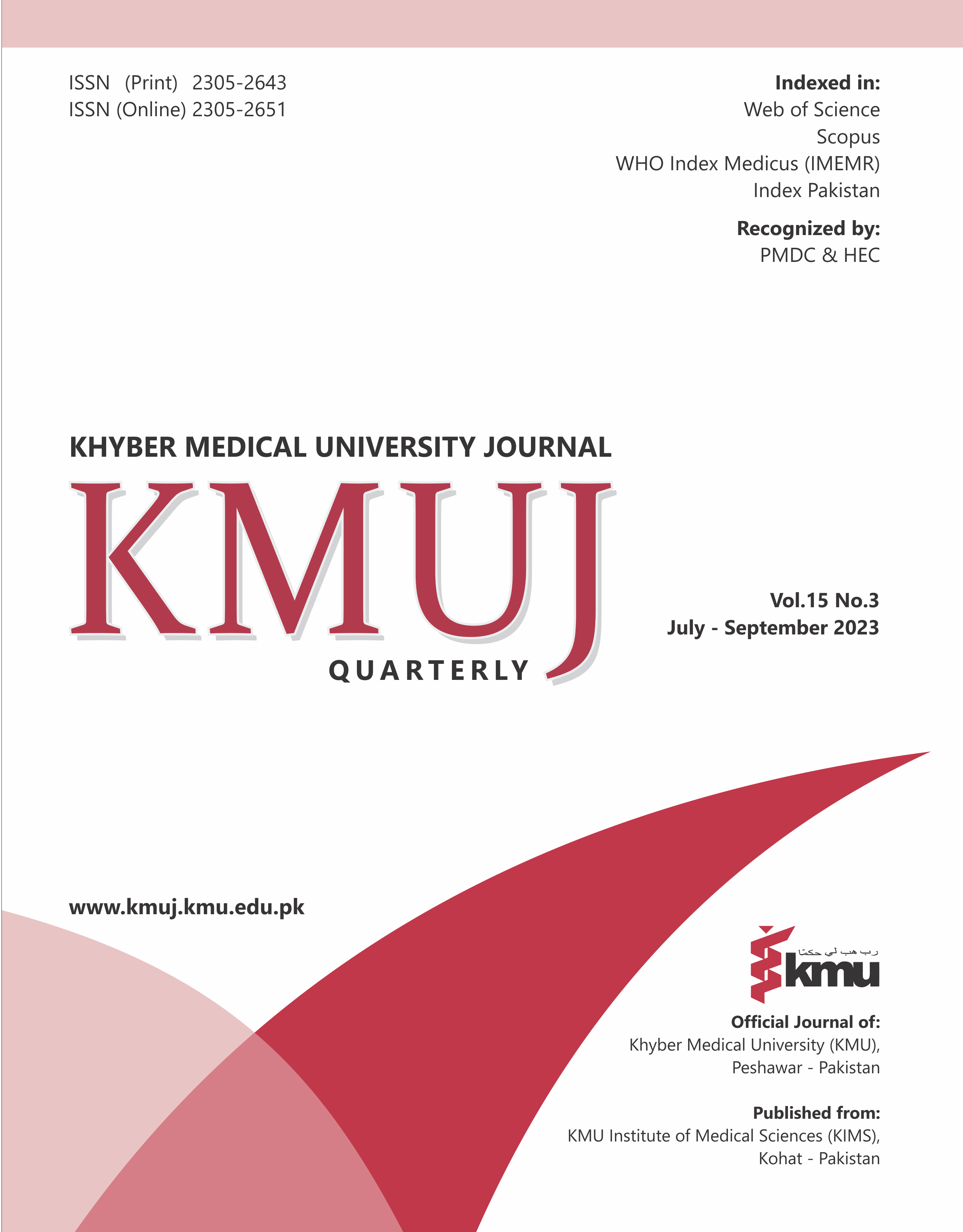Mediating role of emotion disclosure between emotion regulation and apprehension in healthcare professionals during COVID-19
Main Article Content
Abstract
OBJECTIVE: To identify the mediating role of emotional disclosure between emotion regulation and apprehension in health care professionals during Coronavirus Disease 2019 (Covid-19).
METHODS: This correlational study, spanning three months, involved seventy-six healthcare workers. These individuals, encompassing both paid and unpaid personnel serving in healthcare facilities, were selected through purposive sampling. They operated in various health-care settings across public and private sectors in Lahore, Pakistan, and had the potential for direct or indirect exposure to patients or their infectious secretions and materials. Three self-reported measures emotion regulation questionnaire, psychosocial reaction scale, and emotional self-disclosure scale were used along with one demographic sheet to collect data. Descriptive statistics, correlation method and mediation analysis were used to test the hypothesis.
RESULTS: Out of 76 participants, 41 (54%) were males. Mean age of participants was 29.68±8.14 years. Majority (n=58/76;76%) of participants were doctors; 26 (34%) had prior exposure to Covid virus. Correlation analysis revealed that cognitive reappraisal is positively associated with positive emotional disclosure (r=.35; p<.001), and expressive suppression is positively associated with negative emotional disclosure (r=.23; p<.05) and apprehension (r=.43; p<.001) in healthcare workers. Furthermore, negatively emotional disclosure is positively associated with apprehension. Mediation analysis showed that negative emotional disclosure partially mediates the association between expressive suppression and apprehension (β=0.33, SE=0.11, p < .001).
CONCLUSION: Findings suggest healthcare workers to be at greater risk of developing mental health conditions and they need to practice adaptive emotion regulation strategies such as acceptance, reappraisal, and problem solving especially during emergency situations like Covid.
Article Details
Work published in KMUJ is licensed under a
Creative Commons Attribution 4.0 License
Authors are permitted and encouraged to post their work online (e.g., in institutional repositories or on their website) prior to and during the submission process, as it can lead to productive exchanges, as well as earlier and greater citation of published work.
(e.g., in institutional repositories or on their website) prior to and during the submission process, as it can lead to productive exchanges, as well as earlier and greater citation of published work.
References
Li Q, Guan X, Wu P, Wang X, Zhou L, Tong Y. Early transmission dynamics in Wuhan, China, of novel coronavirus–infected pneumonia. N Engl J Med 2020;382:1199-207. https://doi.org/10.1056/NEJMoa2001316
Shereen MA, Khan S, Kazmi A, Bashir N, Siddique R. COVID-19 infection: Emergence, transmission, and characteristics of human coronaviruses. J Adv Res 2020;24:91-8. https://doi.org/10.1016/j.jare.2020.03.005
Daly J, Jackson D, Anders R, Davidson PM. Who speaks for nursing? COVID-19 highlighting gaps in leadership. J Clin Nurs 2020;29(15-16):2751-2. https://doi.org/10.1111/jocn.15305
Xiang YT, Yang Y, Li W, Zhang L, Zhang Q, Cheung T. Timely mental health care for the 2019 novel coronavirus outbreak is urgently needed. Lancet Psychiatr 2020;7(3):228-9. https://doi.org/10.1016/S2215-0366(20)30046-8
Liu Y, Ning Z, Chen Y, Guo M, Liu Y, Gali NK, et al. Aerodynamic analysis of SARS-CoV-2 in two Wuhan hospitals. Nature 2020;582(7813):557-60. https://doi.org/10.1038/s41586-020-2271-3
Sahebi A, Zarnaqi BN, Moayedi S, Yousefi M, Torres M, Golitaleb M. The prevalence of anxiety and depression among healthcare workers during the COVID-19 pandemic: An umbrella review of meta-analyses. Prog Neuropsychopharmacol Biol Psychiatr 2021;107. https://doi.org/10.1016/j.pnpbp.2021.110247
Tansim R, Sujan SF, Islam MS, Ritu AH, Siddique MAB, Toma TY, et al. Prevalence and correlates of anxiety and depression in frontline healthcare workers treating people with COVID-19 in Bangladesh. BMC Psychiatr 2021;271. https://doi.org/10.1186/s12888-021-03243-w
Gross JJ. The Emerging Field of Emotion Regulation: An Integrative Review. Publ Found 1998;2:271-99. https://doi.org/10.1037/1089-2680.2.3.271
Wilson CJ, Holmes YB, Holmes DB. The Effect of Emotion Regulation Strategies on Physiological and Self-report Measures of Anxiety During a Stress-inducing Academic Task. Int J Psychol Psychol Ther 2014;14(1):1-15.
Albott CS, Wozniak JR, McGlinch BP, Wall MH, Gold BS, Vinogradov S. Battle Buddies: Rapid Deployment of a Psychological Resilience Intervention for Health Care Workers During the COVID-19 Pandemic. Anesth Analg 2020;131(1):43-54. https://doi.org/10.1213/ANE.0000000000004912
Giuseppe MD, Nepa G, Prout TA, Albertini F, Marcelli S, Orrù G, et al. Stress, Burnout, and Resilience among HealthcareWorkers during the COVID-19 Emergency: The Role of Defense Mechanisms. Int J Environ Res Public Health 2021;18(10):5258. https://doi.org/10.3390/ijerph18105258
Schwartz GE, Kline JP. Repression, emotional disclosure, and health: Theoretical, empirical, and clinical considerations. In Pennebaker JW (Ed.), Emotion, disclosure, & health. American Psychological Association. 1995; pp177-93. https://doi.org/10.1037/10182-008
Cohen DSJ, Winstanley G, Greene. Understanding doctors’ attitudes towards self-disclosure of mental ill health. Occup Med 2016;66(5):383-9. https://doi.org/10.1093/occmed/kqw024
Gross JJ, John OP. Individual differences in two emotion regulation processes: Implications for affect, relationships, and well-being. J Pers Soc Psychol 2003;85:348-62. https://doi.org/10.1037/0022-3514.85.2.348.
Mahmood Z, Saleem S, Subhan S, Jabeen A. Psychosocial reactions of Pakistani Students towards COVID-19: A prevalence study. Pak J Med Sci 2021;37(2):456-60. https://doi.org/10.12669/pjms.37.2.3063
Hoyt T, Pasupathi M, Smith BW, Yeater EA, Kay VS, Tooley E. Disclosure of emotional events in groups at risk for posttraumatic stress disorder. Int J Stress Manag 2010;7(1):78-95. https://doi.org/10.1037/a0035162
Hayes AF. Introduction to mediation, moderation, and conditional process: A regression-based approach. 2nd ed. New York: The Guilford Press; 2018.
